In a nutshell, Bandcamp is a digital community that facilitates the process of fans directly supporting artists in the first place, and also (nowadays) serves as a gathering spot of like-minded people who want to discover new music and build relationships with the artist.
The article is built around our podcast conversation with Aly Gillani (@djgillaldn) who is a label representative at Bandcamp and founder of First Word Records.
Stream on all platforms here. Follow / share is highly appreciated *smiles*.
The story of Bandcamp begins in 2008 when founder Ethan Diamond was frustrated with the website experience he had with one of his favorite bands at the time (and maybe now?). After a few unsuccessful payment attempts, he ended up getting a random zip file with weird track names. In that post-Myspace and pre-Spotify era he decided he can create a platform that does just that - helps artists sell their music and connects directly to fans. Something which at that time Myspace had failed to do so. I do remember those days where all those pages were flashy concert flyers and follow-for-follow spam.
I really enjoyed his talk with Guy Raz for his How I Built This podcast and that's where the podcast idea came to be. In addition, as a label, we've been exploring Bandcamp for about a year, but as a listener, I've been using and support artists since before Stereofox existed. If you're curious - you can check our profile on the platform here.
Stay up to date.
New music and exclusive updates in your inbox weekly.
What I love about Bandcamp - as a product person and someone trying to run his own company, is that “Bandcamp has become the rarest of Silicon Valley stories”, so it still gives me hope and inspiration to be able to create and run a business that helps people and builds a community without the typical scale, scale, scale mindset.
While I understand the notion that Bandcamp probably won’t scale, in the sense that it’s not for everyone, I do believe in the growing importance of the platform in a future where niche communities and direct Patreon-like support seem the most adequate approach towards achieving sustainability in the music industry.
A few quick facts before I dig further.
- Bandcamp has been profitable since 2012
- They've been called “the heroes of streaming” in a piece by The Guardian from June 2020
- By the time of writing this piece, "Fans have paid artists $786 million using Bandcamp"
- Currently there are more than 10 000 independent labels on the platform, including some of my favourites - Ninja Tune, Fat Cat, Sargeant House, Hyperdub, Late Night Tales, Future Classic, and Tru Thoughts to name a few
What is Bandcamp?
In that podcast I mentioned earlier, Diamond compares Bandcamp to Etsy, and I reckon that's fairly accurate.
The platform allows any artist or label to create their dedicated page (like a digital shop or merch table), connect with fans and sell their craft, regardless of the format (digital, physical, etc.). As the platform grew and attracted more artists, they brought their own fans, and eventually, those fans started exploring other similar artists based on search, suggestions from Bandcamp's editorial or just browsing around and that's where the power of the platform truly lies - it exposes musicians to a whole new world of people who love buying and supporting music.
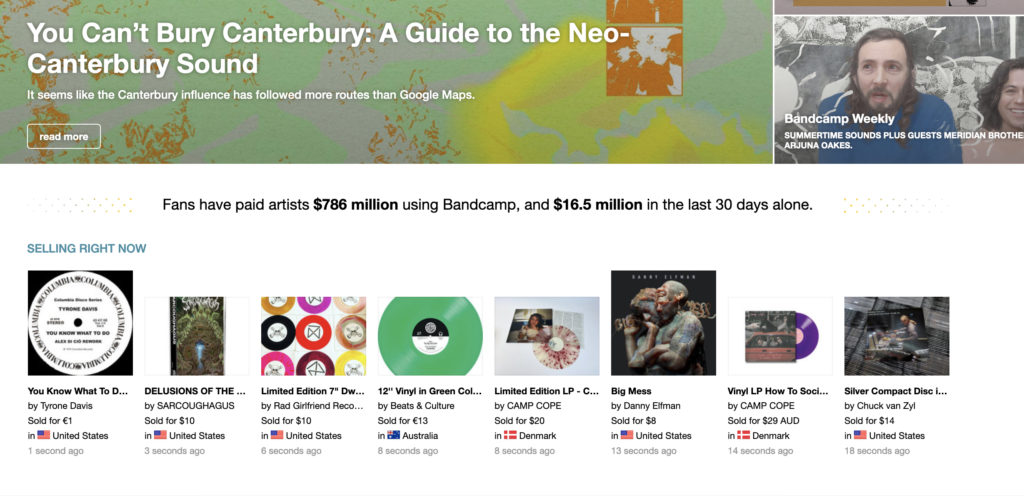
Bandcamp takes something we all know from the physical world and digitalizes it. It is a virtual record shop where fans can explore and find new music, buy it, stream it, interact with other fans or artists and... just have a good time.
A quote from Aly from the end of the interview which I really love and can relate to when it comes to what we do with Sterefoox.
Our aim was just to create an online record store. An online record store has personality, it has idiosyncrasies, and I think we all understand now that yes, there is AI and algorithms and they can predict your every move, but sometimes people do things that are unexpected and weird and sometimes who only ever bought hip hop suddenly buys a folk record and that’s great. We try to encourage that kind of discovery where you find things you wouldn’t otherwise find but you really love.
How is Bandcamp Different from a DSP (Digital Service Provider)
If you look at the traditional DSPs (Spotify, Apple Music, Deezer, Tidal, Pandora, etc.) which are currently in an ongoing war for user's attention and most importantly - money, Bandcamp has carved a niche of its own. But why this is? Well, because Bandcamp isn't a DSP. Yes, you can stream music on there, but that's where similarities stop.
Also,
| Traditional DSPs | Bandcamp |
| Editorial playlists, very track-focused | The album is at the center of everything |
| Payout calculated royalties per stream | Pays out what fans decide a release is worth or $ defined by the creator |
| Uploading is sort of gatekeepered | Anyone can upload and create a page |
| Revenue-based on ads and data | Revenue model based on a share of sales |
| Mostly public | Privately owned |
Is Bandcamp even a digital business? Not according to Diamond. He shares,
“That's what I feel like we're here to build – that system. And the way you do that is by ensuring that artists are compensated fairly and transparently for their work. And that is through the direct support of their fans. I don’t think of Bandcamp as a digital streaming service."
We should not forget Bandcamp's connection to physical goods. It does strike a similarity to Amazon in the sense that even though they don't own any warehouses or delivery services, they do facilitate that process for artists and fans. They do not take the actual orders and they need to be fulfilled by the artists/labels themselves and Bandcamp takes revenue shares of the sales happening on the platform.
Are Bandcamp fans different?
In the podcast linked above, I do briefly discuss this, so I wanted to elaborate a bit more in this piece. In a traditional DSP, a fan might be someone who follows an artist (which is already great), but in the case of Bandcamp a fan I consider is someone who actually supported and paid directly for artists' music. That is why I feel that the level of commitment is way higher on Bandcamp because of that monetary transaction which happens regardless of the fact that the listener can already stream it on there. Those people go beyond the normal to support the music and those first hardcore fans are the ones that push the artist's career further.
Messaging at Bandcamp
That's another feature that differentiates the platform from the traditional DSPs. While SoundCloud does support this direct artist-to-fan connection, Bandcamp truly excels at it. The ability to see who bought your music and directly message them is one of the most powerful things I've experienced so far as a label owner.

Bandcamp Features (AKA Cool Stuff)
In all fairness, we can't give an in-depth overview of all Bandcamp features because 1) they are constantly evolving and 2) I highly recommend you digging around, I'll highlight a few of them that came up in the podcast or that I personally appreciate.
Disclaimer - they might not be features per se, but not sure what other word to use.
That, and all other perks listed here.
Bandcamp Live Streams
The live streams are a fairly new feature that was launched in the post-COVID era and it allows artists to set up intimate or public live stream events and pair this up with direct communication with fans when it comes to promoting their new album, merch drop, or even Q&A - something we discuss with Aly in the podcast.
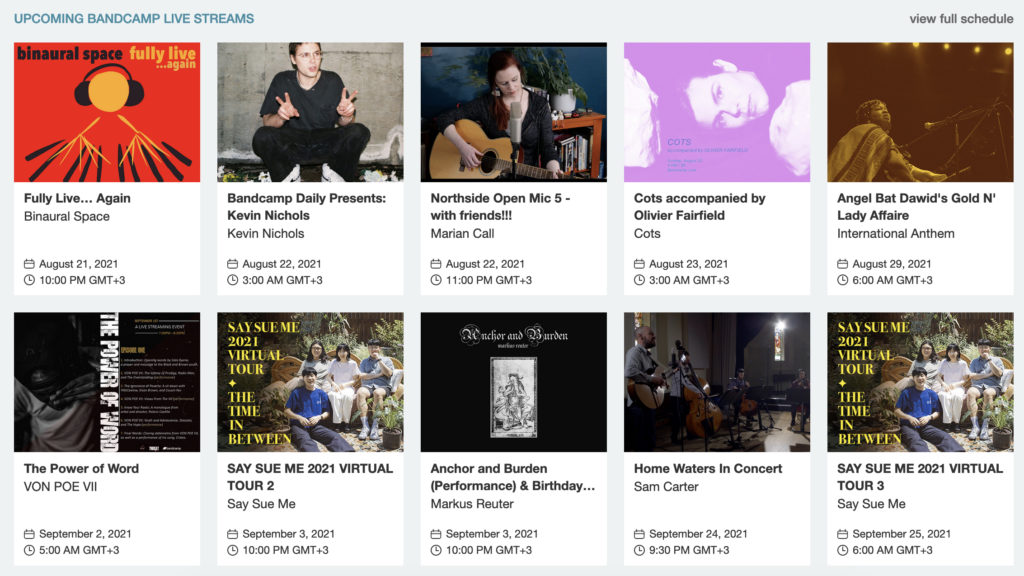
Will dive into this in the How To Achieve Artist Success on Bandcamp section below.
Bandcamp Editorial
The team at Bandcamp does a number of initiatives in order to make sure listeners are exposed to some of the best artists out there. Starting with Bandcamp Weekly (and now Daily), continuing with New and Notable section on the homepage, and closing in with their lists, the team of curators is seriously on top of their game.

For anyone who loves music, you can find a number of editorial write-ups, playlists, and radio shows. The curators are very independent and having a story and good music is the main prerequisite to be featured. Aly shares a bit more in the podcast and I'll make sure to link the guidelines on how to be featured.
Selling Right Now
The widget I love the most on their homepage. A live feed of everything that is selling as you browse Brandcamp. A few times I see something cool or interesting and just start exploring it straight from this feed.
Cleo Sol, I see you!

Bandcamp Discover
A really powerful section within the platform and the reason why your tagging game should be on point.
Bandcamp allows fans to browse by genres and tags, location, and even a format (digital, vinyl, CD, or cassette). There are some really obscure tags and genres, but overall I find things rather accurate given the manual nature of how this works and the fact that it relies on humans describing their music with tags.
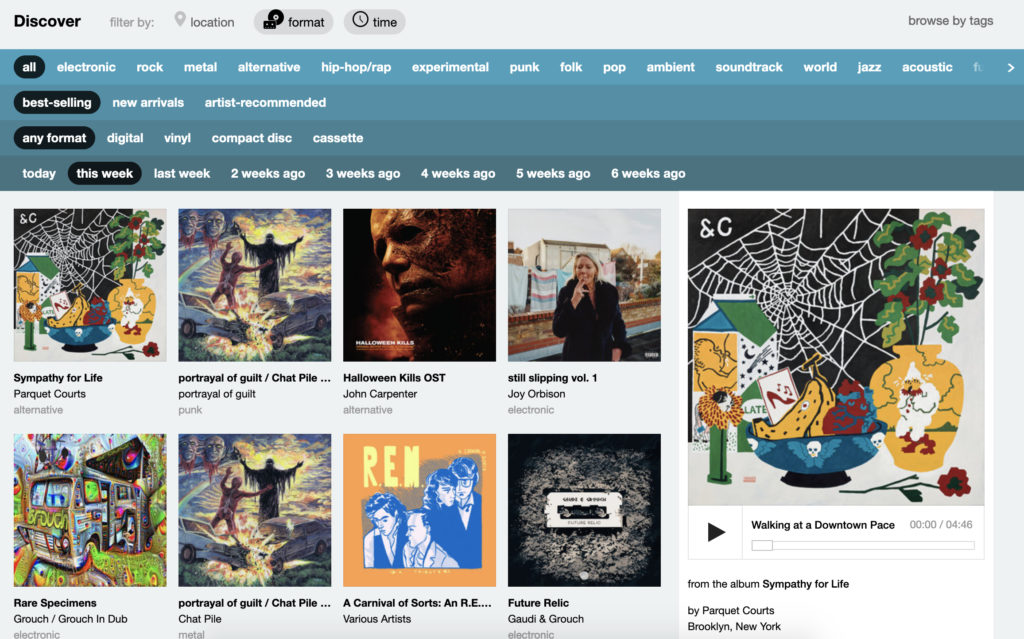
Fan Collections on Bandcamp
When you buy music it ends on your collections page which can be publicly viewed. It is your digital glass frame. I really love exploring the collections of the people who bought the same music as I did. In all fairness, that's often how I end up finding new cool music, so I believe this is a powerful discovery tool. Needless to say - the more people buy your music, the more likely is that you will be discovered while fans interact with each other on the platform.
This is how a fan's collection page looks like (shoutout to JKY who is the last follower we got). He also has some cool stuff he has supported and I did end up listening to some of those records while writing this article.
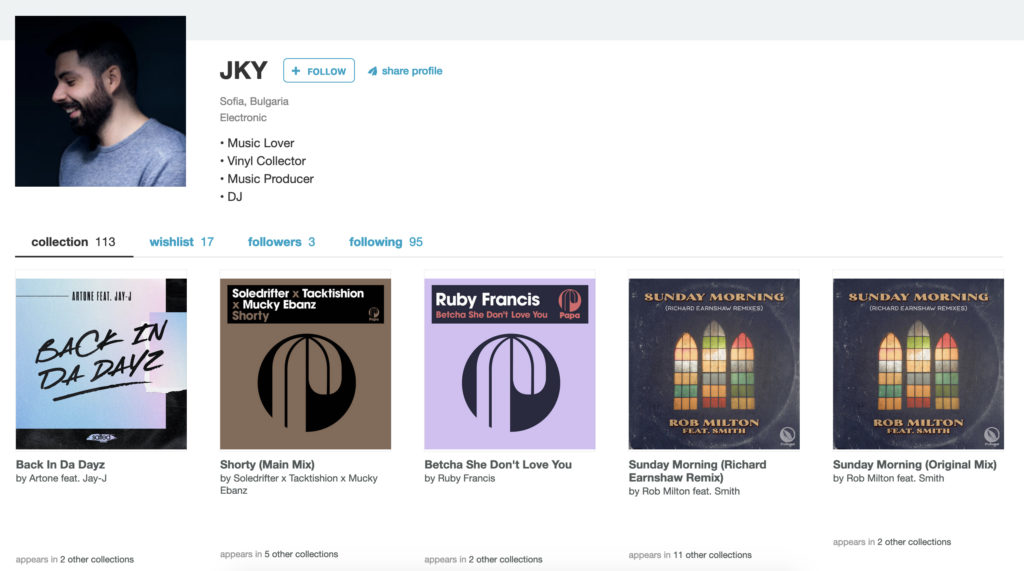
Types of Accounts
Besides the standard artist account that allows you to make a dedicated page for your releases, label owners can pay a bit extra and get the ability to cluster all your artists under your label release.
The feature got launched in 2014 and currently is used by more than 10 000 independent labels on the platform, including Stereofox.
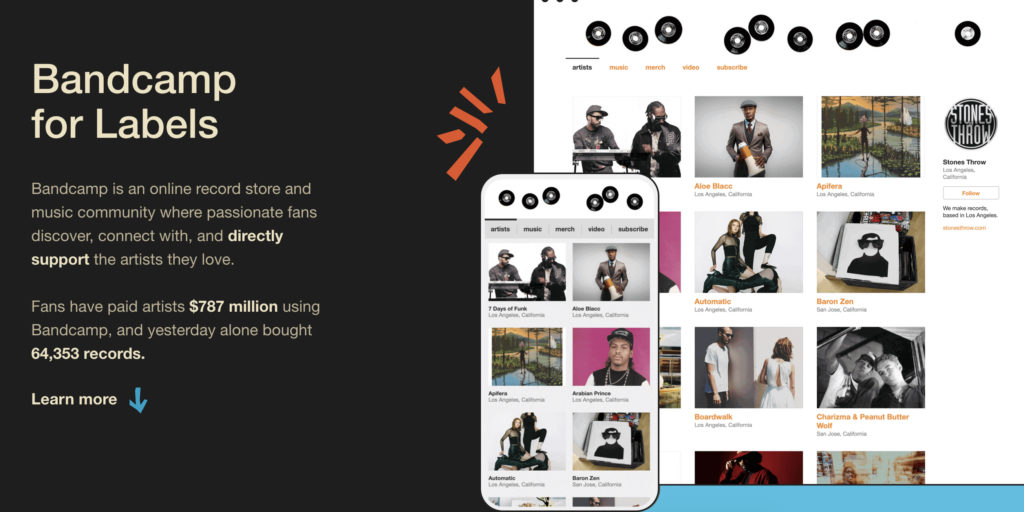
How To Achieve Artist Success on Bandcamp
The main topic we discussed with Aly. It is a bit hard to put this into text, but I will try to facilitate the audio conversation with notes from it and links along the way.
Before that, I'll share a quote from the interview which really engraved in my brain.
I think artists have a lot of pressure now to be everything and do everything. The simple fact is that no-one became an artist because they wanted to be really good at social media or learn how to do email campaign. You do these things because you love music. We sometimes pressure ourselves that if we’re not really good at that, then we’re failing. No. There is no reason to be good at that stuff. If you are - brilliant, it’s a real bonus, but actually it’s fine to ask for help and find other people to do the bits you don’t want to. That’s what kind of what Bandcamp is. We know it’s important for artists to sell directly to their fans but how many artists have got the time and ability to create their own e-commerce site. It’s really difficult to have up-to-date features and all that.
Brand and Profile on Bandcamp
I add this even though it sounds so obvious. The topic of building an artist brand is an extensive one, but I just want to make sure you take this into consideration when building your profile on Bandcamp.
The platform offers some customization opportunities like background colour, images, and logos, so make sure you use that to reflect your artist imagery and brand used in other platforms or social media. When people land on your Bandcamp from Twitter or IG they should feel this continuation experience, if this makes sense. The Bandcamp Artist Guide is also a good place to start with.
Add Info and Use Tags
Your story and the information about the release are key when it comes to Bandcamp. You are not just sharing the music, remember? You share... you.
Also, as mentioned earlier users browse tag a lot when it comes to discovering new music.
Tagging is important. Picking up the ones which are on the homepage is important. If you go onto an artist similar to you would like to be considered with them, pick the same ones they’ve used so you are found in the right place.
Using Bandcamp Live Streams
Using the feature is quite helpful if you are preparing an album release. Aly and his label First Word Records did an album launch with this feature for their artist Children of Zeus' 2021 release Balance. The duo has a great following on Bandcamp, so what they did was a sort of live stream one week before the album came out - people could have the tracks exclusively and interact with each other in the chat room of the stream. People also bought merch and the album itself.
Apparently, people were requesting tracks as well and were getting shoutouts from the guys and it generated quite a lot of engagement. I reckon you can pair this with asking people to pre-save on other platforms or something like that.
In the podcast Aly also discusses potential strategies (~30:00) when setting a stream up, so definitely check this out.
TLDR - using live streams for listening parties is quite helpful
Build Your Audience and Use Messaging
Bandcamp is the perfect place to incorporate strategies like direct fan communication, Q&A or sharing information in the Community section of your Bandcamp page. Every fan you win is an additional opportunity for contact once your next album is out.
"The more you use it, the more you get out of it.", shares Aly. It is important to personalize your page and understand why people follow you or buy your music. Knowing your audience is key.
The platform offers you to send a message to your followers every time you put something out - do not leave this blank and share whatever is on your mind in a few sentences. It doesn't need to be a pitch though. Just something personal for those who already love your work.
If you think about it, if someone has paid for your music before, they will probably do it again.
Release Strategies on Bandcamp
In terms of editorial, the team does not give preferential treatment to those who release exclusively on Bandcamp. People can do that, but it's not something that gives points in front of the editorial team. Aly shares,
My advice to people about that question [exclusive Bandcamp releases], is that I would never tell people not to put their music on a platform. If you’re an emerging artist your music should be everywhere your fans might be. For me, it’s more about where you direct your fans to. Part of being on these platforms is that you earn money from your fans that already exist, and part of it is finding new fans. For the fans you already have and you’re already in communication with, you can direct them to other DSPs where you earn very little money, you get no data who these people are, and you know it’s kind of a drop in the ocean. Or, if you send them to Bandcamp not only you’re definitely going to earn some money from them, but you are also probably going to get their email address and get in touch with them the next time you release. I think that’s really important to think about.
We never do exclusive Bandcamp releases. We do upload our label music everywhere and just make sure we find those new fans to connect with, but it was important to know that there are no special treatments if you go that path. Something I was personally curious about.
Use the Bandcamp App
Data is knowledge and knowledge is power. Download the Bandcamp artist app where you can tap in tons of data including where people came from when buying your music. Whether that's Google organic or notification from Bandcamp's messaging, knowing this definitely helps when shaping your strategies.
In addition, knowing what kind of purchase your fans are most likely to buy is extremely important and it will help you decide whether or not to do that cassette thing you've been thinking about next time or not.
By the way, we just dropped our first vinyl for Boyan's release, so if you made it this far in the article - feel free to check this out and grab a copy if you dig this.

Provide Additional Incentives to Fans AKA Vinyls, Merch or Cassettes?
Adding additional products to your digital release might be what tips the scales.
We looked at 2020 sell data and we saw 2 000 000 vinyl records and 1 000 000 cassettes being sold and those were the 2 biggest forms by quite distance. Physical sales on Bandcamp now make up 50% of platform’s income. That being said, only 12% of the release have vinyls added to them and that’s why we created the Vinyl Crowdfunding Service we offer where you can setup a digital release, choose a vinyl type/design and how much to charge and it turns int o 30 day campaign and if you get enough pledges we manufacture and ship the record for you as an artist.
I think trying to add incentives for fans would increase your chances of success on the platform. In a world where micro-communities continue to rise, fans are more prone to own a physical product that shows their support of an artist.
If you want the vinyl feature, you need to ask the team or Aly ([email protected]) to enable it for you. The team needs to greenlight the campaign after evaluating your chances of success. Because of that vetting procedure, around 95% of the campaigns on Bandcamp meet their targets and get actually pressed.
He shares the story of Lizzy McAlpine who hadn't been on Bandcamp before but has a huge following on Instagram, so they tested how this audience would translate to the platform. Her vinyl campaign got funded with the speed of light and Give Me A Minute is now pressed on vinyl.
Editorial Exposure Opportunities on Bandcamp
Not much of a tip, but rather a list for you to know about all showcase opportunities on the platform.
When it comes to editorial, Bandcamp has the following opportunities:
- Bandcamp Weekly - covers jazz, soul, world music, house, and electronica
- Bandcamp Radio Shows - currently they got one covering metal and one for hip hop
- Bandcamp Daily - written editorial content crafted by the 5 New York-based editors of Bandcamp + the team of 100 freelancers worldwide
- Album of the Day - releases that are worth highlighting but not covered by the editorial team
We like covering music that isn’t being covered by other people. We like covering great stories as well and that’s something you need to bear in mind. It’s not just music being good. It also has to be interesting to someone who doesn’t know anything about you. They need to read the headline and be like “that’s someting I need to check out”.
In terms of the timeline for written editorials, the team prefers to have all info 8 to 12 weeks before the official release day. For Album of the Day, the lead time is 4 to 5 weeks in advance.
Always send the Bandcamp link with all proper info in it - your story, bio, etc. Just send Bandcamp and you're good to go.
Create a Fan Account
A great way to interact with your fans and show your support for other artists is your own fan collections (remember, I spoke about it before?).
For those artists who don't want to post non-music-related content, this is a perfect way to be sort of intimate with your followers and connect with them. It also will build your digital friendship so to say with other artists.
Follow the Bandcamp Artist Guide
I reckon the best place to start with is reading the Bandcamp Artist Guide which you can find here. It has a really good rundown of all editorial procedures, submission form, and lots of useful tips to follow when setting up your page, design, and information.
Do your homework and you'll ace it. That's the most obvious, lets important advice I would give you. I hope you enjoy our chat with Aly and you find it useful!
In case you wonder about Aly's favorite LP of the Day is (a little joke from the podcast), that's John Carroll Kirby's Septet released via Stones Throw Records.

